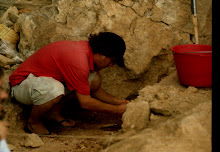Until I see some good publications about the dating and the 'spectacular' lithic artifacts refered to here, I won't be convinced much by this report. This is what the "particularly beautiful spearheads" found below the indented rock face look like

They are further described as being "better crafted and more colourful than other spearheads from the same time and area." Really? These things look like pretty run-of-the-mill unifacial points and/or scrapers to me. Compare them to the following bifacial Still Bay point at the Blombos Schoolhouse site (from Minichillo 2005: 153, Fig. 5.3 - bar = 1cm) and which is of MSA age

The 'python rock' artifacts don't even come close to exhibiting this level of craftsmanship.
The paper in Apollon also states that there are only a few archaeologists working on the African MSA... the flurry of recent publications and presentations at international meetings precisely about that period shows this is not the case at all.
I'll be curious to see how this stands up to critical scrutiny once details about these finds are published in scientific, peer-reviewed journals. In the meantime, you can also check out a very good post on the report on the Remote Central blog and some other comments on Mundo Neandertal (in Spanish) and on John Hawks' blog.
References
Minichillo, T.J. 2005. Middle Stone Age Lithic Study, South Africa: An Examination of Modern Human Origins. Unpublished PhD dissertation, Department of Anthropology, University of Washington.

9 comments:
Wow. Frankly, from what I have seen so far, the whole thing seems border line bogus. I went through the same "article"/webpage you did and the inconsistencies, approximations, lack of clarity, faulty arguments are just about everywhere... got to post on that... the "dating", the "beautifully crafted spearheads" that look like ecofacts, "coming from miles away", the "few MSA archaeologists"!!!... you're right this is going to be a good story. Can't wait for the actual publication...
All:
This find or whatever it is, has been discussied on various venues that I belong to. One of them is an anthropologists' e-list that I subscribe to. Needless to say, the anthropologists seem to think this find might be pretty "thin". Not to mention the implied idea in the article, that somehow or other, the San people are exactly the same people and culture as they were 70,000 years ago. I'm a writer, not an anthropologists, but when I read that, even *I* thought this was, uh, kinda strange.
Anne G
Anne: I am with you. To me, we should all wait for a peer-reviewed publication of the findings. Then, we should be able to constructively critique or evaluate the claims. At least, this will be interesting from a methodological standpoint.
Hi Julien,
I just wanted to say a quick thanks to you for mentioning my post and blog, (which was a bit of a shock) - and also to point out that my post was in part shaped by the response at Anthro-L, to whom I've sent an email apologising for not mentioning them in the first place.
Anyway, great blog, which I haven't read all the way through yet, but look forward to doing so,
Best,
Tim
Tim - my pleasure, and thanks right back at you for mentioning my blog on yours and for giving it such a positive evaluation! I'll definitely be keeping an eye on your posts in the future!
BTW, I tried posting a comment on yours yesterday, and there was no way to make the 'word verification' system work.
Cheers,
Julien
Alex, Anne - I agree... maybe circulating notice of this discover was a bit premature in the absence of solid published research to back it up. Likewise, it may be a bit too early to really evaluate the actual finds without a detailed publication to access... however, it did get circulated, so I suppose that makes it eligible for critical evaluation, if one that must perforce be tentative until full publication of the finds.
I've seen some more pics of those 'beautiful spearheads'... some of them do look pretty well-made, but as a whole, still not exceptional craftsmanship, IMHO. It'll definitely be interesting to see how people react to more formal publication of all the MSA stuff. What I still don't understand, however, is why the Apollon feature doesn't even mention which dating method they used to date Rhino Cave, which I think is odd.
As for the rock representing a 'python'... I don't know, I guess it's possible. And I'm not sure what to think about those indentations, either... I don't know, it's all a bit too vague right now for me to opine definitely one way or the other, but let me ask you this: do you think anyone would have accepted this if a similar find had been reported in a similar way from a Mousterian site? I'm not so sure...
Hi Julien, thanks - sorry you couldn't comment on mine - the verification box can be glitchy at times.
Another aspect of the 70,000 year date is that I think that corresponds to a huge volcanic eruption - Mt. Toba, at around that time, that is thought to have nearly wiped out mankind - not sure if that would have any connection to this though.
Talk soon,
Best,
Tim
Hi Julien, sorry to bother you again, just to let you know I've switched off word verification for the time being, which I normally leave on to avoid being splogged. Tim
Tim - I just posted a comment to your blog about Mt. Toba and related matters. Check it out! Cheers!
Post a Comment